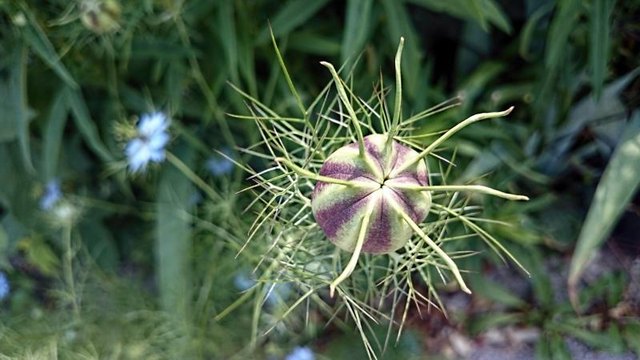
The name “onion seed” is somewhat of a misnomer, as the seed is not in the onion family. It is scientifically recognized as Nigella sativa, Latin for “black plant.” Greeks used the seed to treat numerous ailments, including parasitic worms, headache and toothaches. Nigella sativa has also been discovered in Egyptian tombs, reserved only for the most sacred items. It originated from the Mediterranean area and is cultivated in Northeast India, Saudi Arabia and Egypt.
Nutritional Information
According to Drugs.com, Nigella sativa contains up to 38 percent oil and up to 2.5 percent essential oil. It also contains calcium, fiber, iron, potassium and sodium. Nutritionally, the seeds contain 21 percent protein, 35 percent carbohydrate and 36 percent fat. A study in the August 15, 2013 issue of "Diagnostic Pathology" shows that Nigella sativa also contains compounds that help lower your risk of diabetes.
Essential Oil
Uses of Nigella sativa include the treatment of asthma, diarrhea and dyslipidemia, or abnormal concentrations of lipids in the blood. A King Saudi University study involving the department of veterinary medicine in Saudi Arabia, studied the changes experienced by the influence of the seed's essential oil on rats. They found the oil to have anti-inflammatory, antimicrobial, fever reducing, antineoplastic -- preventing the spread of malignant cells -- and pain-relieving properties. They also report that the oil "reduces blood pressure and increases respiration." The rats showed an increase in hemoglobin and a reduction in glucose, triglycerides and cholesterol. The benefits may lie in its antioxidant and anti-inflammatory properties, but more studies are needed for definitive benefits.
Liver Transplant Study
In a September 2008 study led by Harran University medical director, Dr. Fahrettin Yildiz of Turkey, reported that Nigella sativa countered ischemia, or lack of blood flow, in the newly transplanted livers of rats. This is promising for many types of transplant surgery with the reperfusion, or return of blood flow, to the transplanted organ. Researchers cite the active ingredient as thymoquinone, which has analgesic and anti-inflammatory properties.
Allergies
In a 2003 study by Humboldt University School of Medicine in Berlin, researchers evaluated the effects of Nigella sativa on allergies involving 152 people with some variation of allergic rhinitis, asthma or eczema. The participants were given capsules of 40 to 80 milligrams a day of Nigella sativa oil. Given a definitive scale to rate their symptoms, all reported some level of improvement with the treatment. The results proved, reported the researchers, “to be an effective adjuvant for the treatment of allergic diseases.”
Considerations
Although Nigella sativa has been used for centuries and only allergic skin reactions are the only side effects reported to date, relatively little is known regarding dosing, interactions with other medications, contraindications and toxicity of the spice. Consult a physician before adding the seeds or the oil to your diet or supplement regimen.





No comments:
Post a Comment